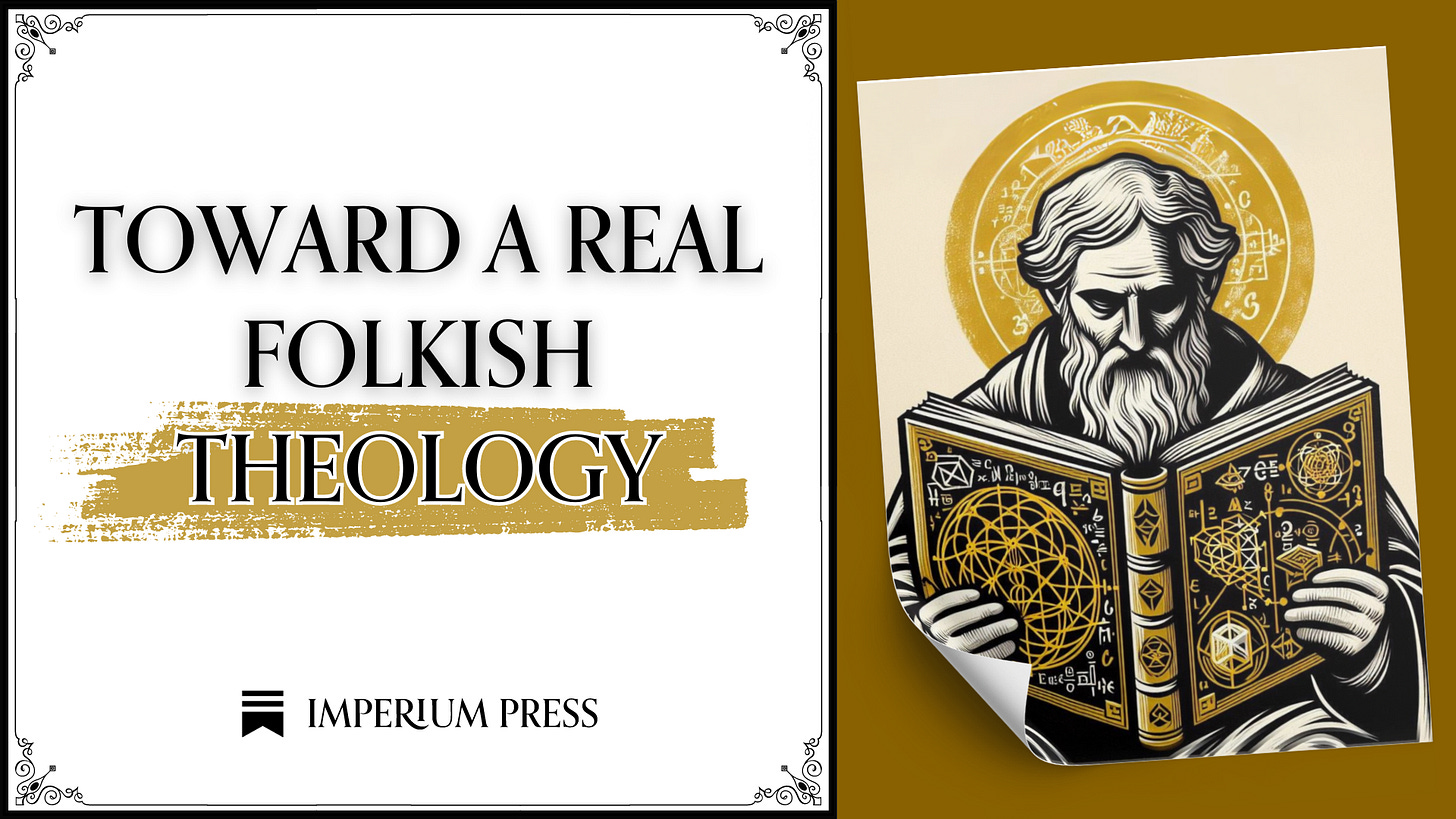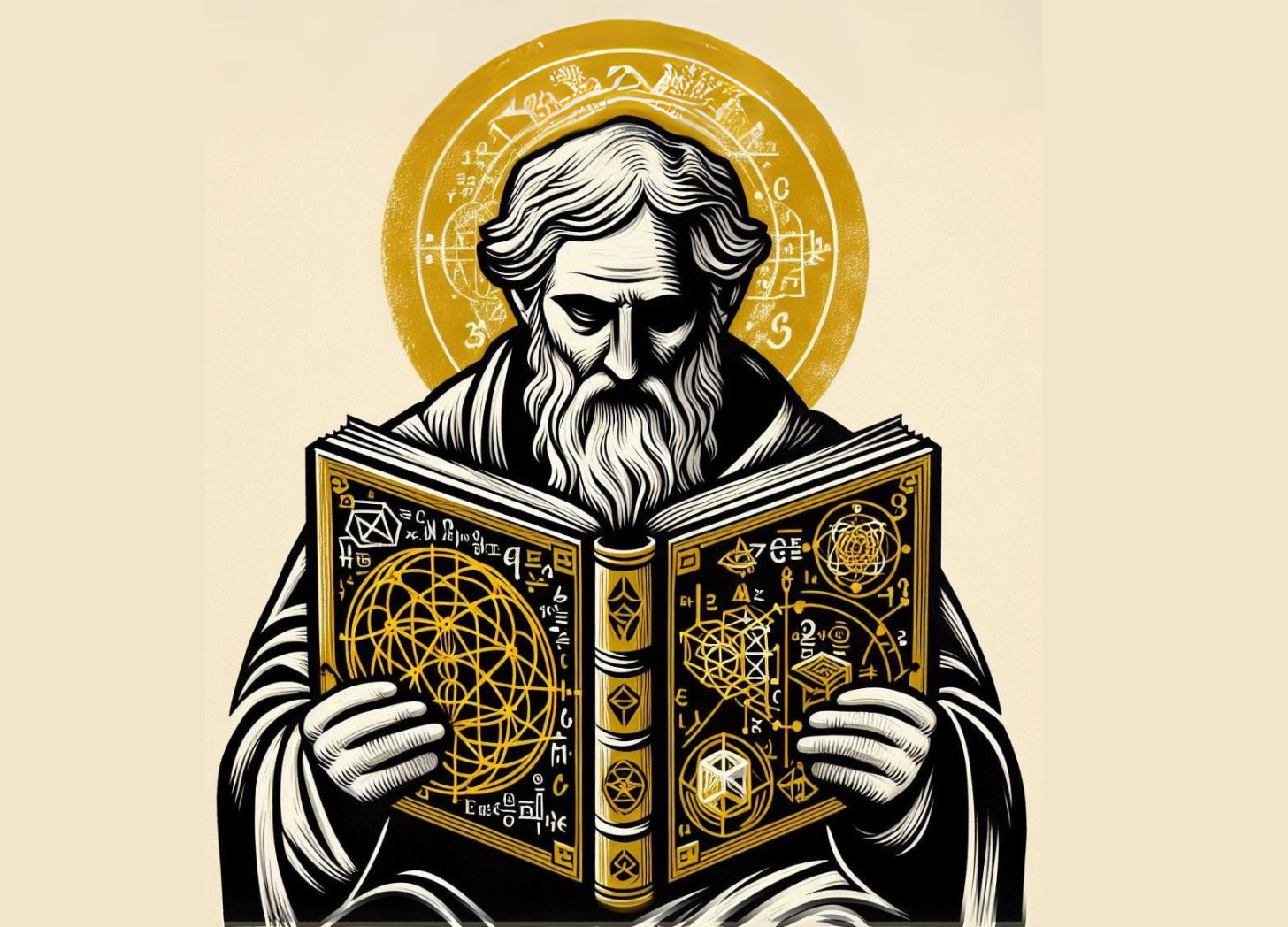If you prefer the audio of this article, click here.
Tristan Powers’ book Germanic Theology, Vol. I has been a resounding success (help us by reviewing it!) From its very release, it courted controversy, but it has managed to stay in the top 50 of all Amazon books on paganism for months, and it’s probably there for good. This is quite a feat for what is essentially an academic treatise, since much of what’s in that top 50 is New Age woo-woo stuff about tarot, witches, and so forth.
But the one critique that keeps coming back, out of the dozens of people who have reviewed it on their own platforms, is that what’s in the book is not theology. This needs some explaining.
What you will find in the book is a line-by-line commentary on the first 13 books of the Poetic Edda. What you will not find—generally, though it is in there at times—is discussion of whether Germanic paganism is inherently monist vs. pluralist, transcendent vs. immanent, idealist vs. physicalist, and what not. This is the conception of theology that people seem to be working with.
When we decided on the title, the thought that a detailed commentary on the Edda might not be theology never even crossed our minds. The Christian church father Origen is considered one of the most important theologians who ever lived, but by all accounts he produced nothing but commentary, with one exception which survives only in heavily abridged form.1 Powers’ book is theology by the classical reckoning. So what kind of theology are people asking for?
The short answer is that they are asking for metaphysics. Interested folk, either Germanic pagans who want to treat their religion as a real religion, or simply curious onlookers who want to know more, are hungry for a deeper and more serious take on the Edda than has so far been available. They are looking for answers to questions of being, of modality, causation, temporality, identity, universals, and the like.
Theology does indeed involve this. And what’s more, as ideas of theology grew and branched out over the centuries—as Augustine turned into Aquinas—theology increasingly turned toward more abstract matters. So there is something to the critique that what’s in Powers’ book is “not theology”. It is generally not metaphysics.
But is this what’s right for Germanic paganism? Consider that the Thomistic conception of the divine looks worryingly unlike anything in the Torah or the gospels, or any other religion for that matter. As time went on, Christian theology and Christian exegesis became estranged, with the result that Christianity has now unfortunately culminated in atheism. Let us hold this in mind as we move along.
Folkish paganism is concerned to revive the deepest and most ancestral European spirituality, and this includes theology. The problem is that pagans have no surviving theology, apart from the blatant heresies of classical Greek philosophy, which went on to become Christian orthodoxies. We have no other systematic theology from the Germanics, Celts, Balts, Slavs, or anywhere else in Europe. We simply don’t know what theology looked like as practiced by the Germanic gothar or the Celtic druids. We do, however, know what ethics looked like to these peoples, and how it changed over time. And we can use this to reasonably infer what theology might have looked like to them.
Among all Indo-Europeans, “ethics proper” is not known until rather late—what appears before this is a patchwork of taboos. By this is meant a massive series of ad hoc injunctions to do this or that, only in this or that case, only in this or that way, only for this or that purpose. Generalization in normative matters is unknown among archaic Indo-European peoples—the first time it appears is in the Upanishadic texts in India, and somewhat later in Greek philosophy. At this point, taboos become rationalized into a system of norms. This system organizes norms into abstract categories under which a number of properly distinct taboos are grouped, for the purposes of simplifying analysis and inferring in cases where tradition does not provide guidance. This is ethics as we now understand it.
It is important to observe that ethics is a structure that is built out of taboo—if ethics is the forest, taboo is the trees. If you’re doing ethics right, then your ethics does not transcend or call into question its constituent parts. Ethics must not presume to dictate to taboo since it has no resources to do so that are not themselves taboos. The most it can say to taboo is to point out where two traditional commands contradict each other, and perhaps to offer some guidance in resolving or deciding between the two—maybe not even that.2
It is valid for us to distinguish between ethics and taboo, as we have done here. But any traditional and folkish approach to “what we ought to do” must accept that taboo is the master and ethics the servant. This is where folkishness shows itself to be distinct from, and superior to, other worldviews. Folkishness—alone, it seems—understands that we cannot allow the son to govern the father, and is willing to apply this idea consistently and follow it to its logical conclusions.
The relationship between taboo and ethics is precisely the same relationship as between exegesis and theology. There is no metaphysics that does not ultimately derive from tradition. Metaphysics cannot presume to correct or dictate to tradition. Metaphysics is the forest and tradition the trees. Where metaphysics disagrees with tradition, metaphysics is wrong. Where tradition disagrees with itself, metaphysics is not in a position to correct it. Only authority can correct it, which derives from tradition. This position—that tradition trumps metaphysics—is indeed a radical position by the standard of today. But it was not radical for our Germanic ancestors, and we can infer quite reasonably that this is the kind of theology they practiced, not least because they left us absolutely no systematic metaphysics, and a great deal of tradition.
To bring this discussion back to practical reality, not only must metaphysics be based on exegesis, but where Germanic paganism is at now, the vast majority of theology should be exegesis anyway. This is simply what’s needed, even if the goal is to build up an elaborate metaphysical system. Recall that the great Christian periods of metaphysical system building came with the scholastics, fully a millennium after early theologians like Origen laid the groundwork with oceans of commentary.
The task of folkish theologians going forward must be to clear away the Axial accretions that have contaminated our understanding. This does not mean not doing metaphysics. It does not mean not doing theology. It simply means putting things in order—it means always and everywhere subordinating metaphysics to exegesis, and subordinating theology to tradition. It is not a matter of building an alternative Aristotelianism tailored to Germanic paganism. As Powers himself said to me in conversation, “the alternative is already there, it’s called the Poetic Edda.”
On the First Principles.
Because deciding to ignore traditionally mandated injunctions presupposes authority above those injunctions, which ethics does not and cannot have, being entirely derived from those injunctions.







An extremely important iterative breakdown and a clear, concise mapping of the authority-ethics-virtue family relation tree. Hail the gods.